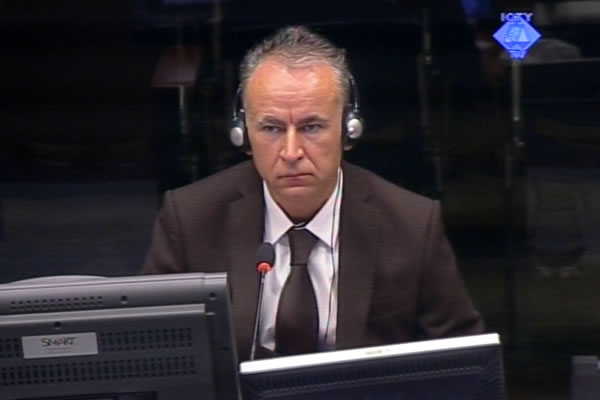Home
TOO YOUNG TO SERVE IN THE ARMY, OLD ENOUGH TO KILL
The trial of Ratko Mladic continued with the evidence of Grgo Stojic, one of six Bosnian Croats the Serb forces took away from the village of Skrljevita near Sanski Most to be executed on 2 November 1992. The defense contends that the perpetrators of the crime belonged to the 'irregulars' and at least two of them were 'legal minors'. The witness replied that the two of them were too young to serve in the army 'but old enough to kill'. Mladic missed the first part of the hearing because he wanted to 'finish his breakfast'
 Grgo Stojic, witness at the Ratko Mladic trial
Grgo Stojic, witness at the Ratko Mladic trial Grgo Stojic started his testimony at the trial of Ratko Mladic. On 2 November 1992, Serb forces took six Bosnian Croats to be executed in the village of Skrljevita near Sanski Most. Stojic is the sole survivor. The witness later learned that several other people had been killed in the village that day. Sanski Most is one of the six municipalities in Bosnia and Herzegovina where, as alleged in the indictment against Mladic, the crimes of the Serb forces against Croats and Muslims reached the scale of genocide.
Stojic has testified about the persecution of Croats at the trials of Radoslav Brdjanin and Radovan Karadzic. The prosecutor read out the summary of Stojic's statement. Stojic and five other Croat civilians were arrested, robbed and finally brought to the foothills of the Glamocnica Forest, where an execution was staged. Only the witness survived; he was wounded in the stomach, hand and hip. He was first taken to Sanski Most and then to a hospital in Banja Luka. He was detained in a room he described as a 'cell' in the urology ward.
Soldiers kept guard in front of the 'cell' day and night. They removed the door handle and kept it with them. With the soldiers' permission, other soldiers and civilians came to the room and beat prisoners with boots, rifle butts and whatever they could lay their hands on. Stojic was beaten twice. On 11 December 1992, Stojic was 'released' from the hospital. He went to Croatia and then to America, where he had hand surgery and medical treatment.
In the cross-examination, Mladic's defense counsel Dragan Ivetic argued that the Serb authorities in Sanski Most launched an investigation as soon as they learned from witnesses about the crime in the village of Skrljevita. The authorities established the identities of four perpetrators. Two of them - Todor Vokic and Goran Vukojevic - were minors and couldn't have been part of the 'regular' Serb forces. The other two, Danilusko Kajtez and Milos Maksimovic, were tried in 2007 at the District Court in Banja Luka. Kajtez and Maksimovic were both acquitted and in 2008 the Supreme Court of Republika Srpska confirmed the judgment.
The witness said that 15-year old Vokic and 17-year old Vukojevic would have been 'too young' to do their military service in peacetime, but were 'old enough to kill', the witness added. Stojic agreed that the four executioners couldn't be considered as 'regular' soldiers and described them as 'criminals carrying arms'.
As Ivetic had put it to the witness that Kajtez was a 'common criminal doing things for financial gain', in the re-examination the prosecutor noted there were documents from the Banja Luka military court stating that Maksimovic and Kajtez were members of the VRS 6th Krajina Brigade.
Ratko Mladic missed the first part of Stojic's evidence this morning. He was not in court on time for the beginning of the trial. According to a report from the Detention Unit, Mladic wanted to 'finish his breakfast' and that apparently took a while. In the judges' view, his expressed preference for breakfast rather than a timely arrival in court meant that Mladic waived his right to attend the trial. The accused arrived in the Tribunal some 15 minutes after the beginning of the hearing but was not allowed to enter the courtroom until after the first break.
Linked Reports
- Case : Mladic
- 2012-10-12 MLADIC COULD ORDER A CEASE FIRE IF HE WANTED
- 2012-10-11 GENERAL MLADIC 'OUT OF CONTROL'
- 2012-10-10 MLADIC HAD 'MORE CANNONS THAN SOLDIERS'
- 2012-10-31 CHILDREN MASSACRED WHILE PLAYING IN THE SNOW
- 2012-11-01 BLOCKING SARAJEVO TO ACHIEVE OBJECTIVES IN OTHER BATTLEFIELDS
- 2012-11-02 LEGITIMATE MILITARY TARGETS IN SARAJEVO
